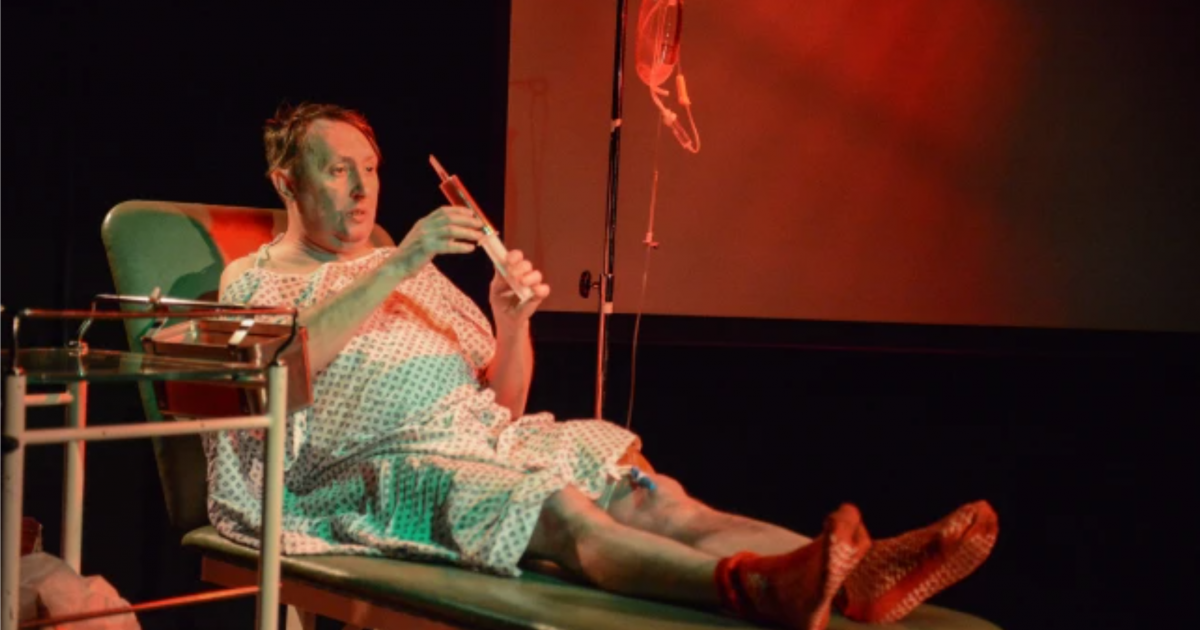Managing Penile Cancer
- In 2017, Richard Stamp discovered a small lump at the base of his penis. After a few attempts to address the lump, Stamp decided to turn a blind eye, hoping it would go away on its own.
- The lump only grew bigger, and when Stamp finally visited the doctor, he was diagnosed with late stage penile cancer. He would have to amputate his penis.
- Stamp has used his art to share his story and spread penile cancer awareness. His one-man show Dick One Man in 100,000 will be performed in London.
The story starts in 2017 when Stamp discovered a small lump in the base of his penis. "I had a bit of pain, which I thought was odd, but didn't think it was likely to be serious," he wrote in Metro. He tried an antifungal medication cream, but it didn't improve. He took a trip to the ocean, hoping the salt water would help. The lump didn't change, so Stamp decided to just ignore it.
Read MorePenile Cancer: Stamp’s Treatment Journey
A biopsy confirmed Stamp's misfortune. The lump had grown, and now it was causing its owner practical problems. "What had been a pea-sized lump was now more like a cocktail sausage," Stamp wrote. "I couldn't pee and residue was coming out; it was very painful." But in one way, Stamp was luckyif you think of luck in relative terms. His local hospital was one of the leading penile cancer hospitals in Europe. Stamp opened up to his family, including his two children in their twenties. "Everyone was shocked as no one had heard of this type of cancer," Stamp said. What a shocking way to learn.A penile prosthesis is a great option for men who experience erectile dysfunction after cancer treatment.
Stamp went in for his surgery in May 2018. He had another stroke of luck. "My doctors reassured me they would be able to save part of it," he wrote. "I could even have sex and have children again! I could also have reconstructive surgery in the future."
When Stamp was able to leave the hospital, he still had the base of his penis, and another biopsy showed that the cancer had not spread. Stamp wasted no time turning his bizarre experience into an opportunity to make even more bizarre artand also to spread penile cancer awareness. It was the genesis of his show, Dick One Man in 100,000.
‘Life Imitates Art Far More Than Art Imitates Life’
Since then, Stamp has found many opportunities to share his art. He has shared his story through performances at medical conferences and cancer charity events. At one event, 150 participants donned penis suits and did what Stamp calls "the Willy Waggle".
"Because of events like these, awareness is growing slowly," Stamp wrote.
Stamp has found his way on to morning television and appearances at "Stand Up to Cancer" events. "I've even been approached to do a TV documentary titled Shopping For A New Penis on Channel 5," he wrote.
He has found comfort in meeting other penile cancer survivors, and he has seen significant strides made in conversations surrounding the disease. Last year brought the first ever International Penile Cancer Conference, and from now on, every September 20 is International Penile Cancer Day.
Stamp is scheduled for reconstructive surgery in 2022, where he will have a laser treatment on his arm that will be used "to build the scaffold of [his] new penis."
Resources For Handling a Diagnosis
Receiving a cancer diagnosis can be an earth shattering experience, but it’s important that you know resources are always available to you. Whether it’s a support system, prioritizing your mental health, or getting a second opinion, you and your doctor can map out the best way to handle this diagnosis and take it on together.
Find a Support System
Whether it’s a family member, friend, or support group of fellow cancer patients, support can come in a number of different ways. Having people surround you to help you during this difficult time is often a great way to help motivate you to push through treatment, and also helps your mindset. Many cancer survivors have said that attending support groups helped them tremendously, as connecting with others who have gone through a similar experience made them feel less alone in their battle. Of course, support groups are not always for everyone, so it’s important to recognize the help you need and not be afraid to ask for it.
Prioritize Your Mental Health
Coming to terms with a cancer diagnosis can be difficult, and it can be hard to focus on anything other than treatment. However, studies have shown that a positive mindset can make a huge difference in the process, and is actually linked to successful treatment outcomes. In order to prioritize your mindset, consider taking some time during your day to do things you enjoy, no matter how big or small.
Dealing with a grief after a cancer diagnosis is normal, and talk therapy can help.
Get a Second Opinion
While navigating treatment options, it’s never too early or too late to advocate for yourself or ask questions. Sometimes, getting a second opinion can be helpful in order to learn all about your options and talk to specialists who are experts in the field. This way you can have all the information and be able to figure out what you feel most comfortable with and which one you believe is the best option for you.
"If I had any advice for you following a cancer diagnosis, it would be, first, to seek out multiple opinions as to the best care," Dr. Steven Rosenberg, National Cancer Institute Chief of Surgery, told SurvivorNet in a previous interview. "Because finding a doctor who is up to the latest of information is important."
Contributing: Shelby Black
Learn more about SurvivorNet's rigorous medical review process.


